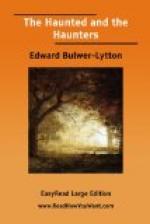The American and his wife took charge of the little boy, the deceased brother having by his will left his sister the guardian of his only child—and in the event of the child’s death, the sister inherited. The child died about six months afterwards—it was supposed to have been neglected and ill-treated. The neighbours deposed to have heard it shriek at night. The surgeon who had examined it after death, said that it was emaciated as if from want of nourishment, and the body was covered with livid bruises. It seemed that one winter night the child had sought to escape—crept out into the back-yard—tried to scale the wall—fallen back exhausted, and been found at morning on the stones in a dying state. But though there was some evidence of cruelty, there was none of murder; and the aunt and her husband had sought to palliate cruelty by alleging the exceeding stubbornness and perversity of the child, who was declared to be half-witted. Be that as it may, at the orphan’s death the aunt inherited her brother’s fortune.
Before the first wedded year was out, the American quitted England abruptly, and never returned to it. He obtained a cruising vessel, which was lost in the Atlantic two years afterwards. The widow was left in affluence; but reverses of various kinds had befallen her: a bank broke—an investment failed—she went into a small business and became insolvent—then she entered into service, sinking lower and lower, from housekeeper down to maid-of-all-work—never long retaining a place, though nothing peculiar against her character was ever alleged. She was considered sober, honest, and peculiarly quiet in her ways; still nothing prospered with her. And so she had dropped into the workhouse, from which Mr J—— had taken her, to be placed in charge of the very house which she had rented as mistress in the first year of her wedded life.
Mr J—— added that he had passed an hour alone in the unfurnished room which I had urged him to destroy, and that his impressions of dread while there were so great, though he had neither heard nor seen anything, that he was eager to have the walls bared and the floors removed as I had suggested. He had engaged persons for the work, and would commence any day I would name.
The day was accordingly fixed. I repaired to the haunted house—we went into the blind dreary room, took up the skirting, and then the floors. Under the rafters, covered with rubbish, was found a trap-door, quite large enough to admit a man. It was closely nailed down, with clamps and rivets of iron. On removing these we descended into a room below, the existence of which had never been suspected. In this room there had been a window and a flue, but they had been bricked over, evidently for many years. By the help of candles we examined this place; it still retained some mouldering furniture—three chairs, an oak settle, a table—all of the fashion of about eighty years ago. There was a




